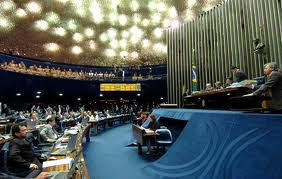Computer Policy of Brazil
 The PNI was established by a law approved by the National Congress in October 1984, with an enforcement expiry date of eight years. In this sense it represents
The PNI was established by a law approved by the National Congress in October 1984, with an enforcement expiry date of eight years. In this sense it represents
a unique case of sectorial policy regulated by law and with a previously established termination. Despite that it was a target for strong internal and international pressures contrary to market protection.
The implementation of the PNI had positive and negative aspects. Within the positive aspects stand out the fast growth of the computer industry in the 80`s, while the manufacturing industry as a whole remained stagnant; the majoritarian presence of national companies; the significant creation of direct jobs (79 thousand until 1989, of which 24 thousand of superior education level); the high spending level in R&D of national companies (around 5% of the net revenue) comparative to the average of the manufacturing industry, and the high import coefficient (18%) comparative to the manufacturing industry as a whole.
However, many negative aspects damaged (or were a result of) its implementation. In the first place, the lack of a strategic vision, demonstrated by the absence of synergies with other industries of the electronic group, the non - development of the microelectronics industry,
the inattention to software capability, and the non-application (or only partial application) of the instruments predicted by the computers law. In second place, the absence of an export policy, which has put limits to the possibilities of enlarging the scale.
In third place, the underestimation of the rhythm and intensity of technical change in the electronic industry. Lastly, the policy's non-selectiveness which has overestimated the possibility of arousal of innovative businessmen and has given opportunity, in fact, to the appearance of rent-seekers businessmen in the computer industry, in a similar way to what happened in the manufacturing industry in general, under the industrial policy's protective schemes. But, besides everything, the absence of a clear policy position and of support by the federal government's economic area itself, and the absence of society's support for the computer policy must be mentioned.
In 1991 a new computers law was approved by the Congress, confirming the end of market protection at the predetermined expiry date (October 1992), altering the concept of national industry in order to favor a larger participation of foreign money, and creating new tax incentives for the computer industry with investments in R&D of a minimum of 5% of the net revenue in return.
Brazilian Parliament
Brazilian Senate
Ministry of External Rel.
Twitter
Tourism Information-MoT














